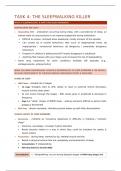Nrem sleep - Study guides, Class notes & Summaries
Looking for the best study guides, study notes and summaries about Nrem sleep? On this page you'll find 600 study documents about Nrem sleep.
Page 2 out of 600 results
Sort by
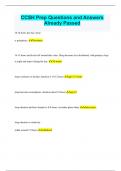
-
CCSH Prep Questions and Answers Already Passed
- Exam (elaborations) • 58 pages • 2024
-
- $11.99
- + learn more
CCSH Prep Questions and Answers Already Passed 16-18 hours per day; sleep is polyphasic. Newborns 14-15 hours and levels off around that value. Sleep becomes less distributed, with primary sleep at night and nap(s) during the day. 16 weeks sleep continues to decline; duration is 10-12 hours ages 2-5 years sleep becomes monophasic; duration about 10 hours age 10 sleep duration declines sharply to 8-9 hours; circadian phase delay adolescence, sleep duration is relatively st...
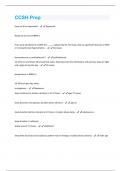
-
CCSH Prep questions and Answers Latest Update Fully Solved 100%
- Exam (elaborations) • 37 pages • 2024
-
- $7.99
- + learn more
Same as W or depressed? - depressed Response to Co2 in NREM is From early adulthood to midlife N3 _____, replaced by N1, N2 sleep, with no significant decrease in REM or increased sleep fragmentation. - decreases Homeothermic or poikilothermic? - poikilothermic 14-15 hours and levels off around that value. Sleep becomes less distributed, with primary sleep at night and nap(s) during the day. - 16 weeks temperature in NREM is 16-18 hours per day; sleep is polyphasic. - Newborns sleep co...
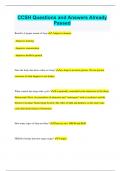
-
CCSH Questions and Answers Already Passed
- Exam (elaborations) • 25 pages • 2024
-
- $9.99
- + learn more
CCSH Questions and Answers Already Passed Benefits of proper mount of sleep - Improves memory - Improves learning - Improves concentration - Improves health in general Does the body shut down when we sleep? no, sleep is an active process. We are just not conscious of what happens in our bodies. What controls the sleep-wake cycle? It is primarily controlled by the interaction of the Sleep Homeostatic Drive (Accumulation of adenosine and "somnogens" such as cytokines) and the I...
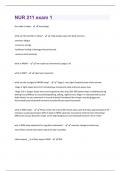
-
NUR 211 exam 1 Questions With Complete Answers.
- Exam (elaborations) • 26 pages • 2024
- Available in package deal
-
- $7.99
- + learn more
the study of sleep - Somnology what are the benefits of sleep? - -help people cope with daily stressors -prevents fatigue -conserves energy -facilitates healing of damaged tissue/wounds -restores mind and body what is NREM? - non-rapid eye movements (stages 1-4) what is REM? - rapid eye movement what are the 4 staged of NREM sleep? - -Stage 1: very light sleep/only lasts a few minutes -Stage 2: light sleep/ lasts 10-15 minutes/eye movements stop and brain waves slow -Stage 3 & 4: deepe...
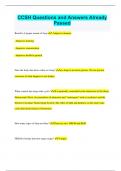
-
CCSH Questions and Answers Already Passed
- Exam (elaborations) • 25 pages • 2024
-
- $10.99
- + learn more
Benefits of proper mount of sleep - Improves memory - Improves learning - Improves concentration - Improves health in general Does the body shut down when we sleep? no, sleep is an active process. We are just not conscious of what happens in our bodies. What controls the sleep-wake cycle? It is primarily controlled by the interaction of the Sleep Homeostatic Drive (Accumulation of adenosine and "somnogens" such as cytokines) and the Intrinsic Circadian Timekeeping System (The effect of...
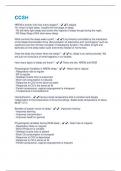
-
CCSH QUESTIONS & ANSWERS RATED A+
- Exam (elaborations) • 11 pages • 2024
- Available in package deal
-
- $8.39
- + learn more
NREM is broken into how many stages? - ️️3 stages. -N1 which is light sleep. Usually the first stage of sleep. - N2 still fairly light sleep and covers the majority of sleep we get during the night. - N3 Deep Sleep (AKA slow wave sleep) What controls the sleep-wake cycle? - ️️It is primarily controlled by the interaction of the Sleep Homeostatic Drive (Accumulation of adenosine and "somnogens" such as cytokines) and the Intrinsic Circadian Timekeeping System (The effect of li...
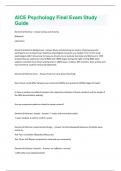
-
AICE Psychology Final Exam Study Guide Graded A+
- Exam (elaborations) • 47 pages • 2024
- Available in package deal
-
- $10.49
- + learn more
Dement & Kleitman - Answer-(sleep and dreams) Biological Laboratory Dement & Kleitman Background - Answer-Sleep and dreaming are hard to study because the participants are unresponsive; therefore physiological measures are needed. Prior to this study psychologists didn't know how to measure dreams, but a study by Aserinsky and Kleitman in 1955 showed that we experience several REM and nREM stages during the night. During REM sleep subjects recorded more dream activity than in nREM sleep....
Summary of Task 4 in Forensic & Legal Psychology in a Nutshell
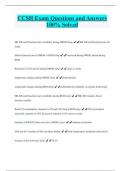
-
CCSH Exam Questions and Answers 100% Solved
- Exam (elaborations) • 18 pages • 2024
- Available in package deal
-
- $13.99
- + learn more
CCSH Exam Questions and Answers 100% Solved HR, RR and blood pressure variability during NREM sleep ️️HR, RR and blood pressure all stable Skeletal muscle tone in NREM vs REM sleep ️️Preserved during NREM, absent during REM Response to CO2 and O2 during NREM sleep ️️same as awake temperature changes during NREM sleep ️️homeothermic temperature changes during REM sleep ️️poikilothermic (inability to regulate body temp) HR, RR and blood pressure variability during R...
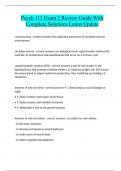
-
Psych 111 Exam 2 Review Guide With Complete Solutions Latest Update
- Exam (elaborations) • 30 pages • 2024
-
- $14.49
- + learn more
consciousness - correct answers the subjective awareness of ourselves and our environment circadian rhythm - correct answers our biological clock; regular bodily rhythms (for example, of temperature and wakefulness) that occur on a 24-hour cycle suprachiasmatic nucleus (SCN) - correct answers a pair of cell clusters in the hypothalamus that controls circadian rhythm. in response to light, the SCN causes the pineal gland to adjust melatonin production, thus modifying our feelings of sleepin...

Study stress? For sellers on Stuvia, these are actually golden times. KA-CHING! Earn from your study resources too and start uploading now. Discover all about earning on Stuvia



